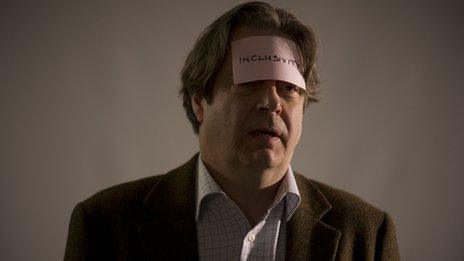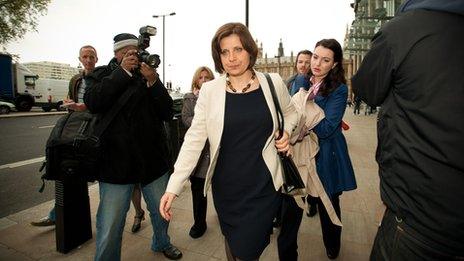The Thick Of It: When life imitates sweary art
- Published
Watch some of examples of perceived similarities between The Thick of It and real-life politics
Political comedy The Thick of It might be satire, but Westminster-watchers have seen many of its fictional storylines come to life. What does this tell us about modern politics, asks Sean Gray, one of the show's writers.
Week after week, policies and storylines from this series of The Thick Of It have emerged in real-life politics.
As a writer on the show, it has been a peculiar joy to watch as life imitates sweary art.
In the second episode of the series, Nicola Murray - our fictional leader of the opposition - decides to support a government policy of scrapping primary school breakfast clubs. Within hours of broadcast, a report was published in a Sunday broadsheet highlighting cuts facing real-life breakfast club initiatives.
In the following episode, our coalition characters, Fergus and Adam, launch a community bank - "the We Bank"- with £2bn-funding. The following Monday, Business Secretary Vince Cable announced a new £1bn "business bank".
Even while we were writing back in January, policies we'd put in the show were penny-crayoning themselves into reality.
Less than a week after the meeting where we originally brainstormed the "Silicon Playgrounds" idea, Education Secretary Michael Gove announced plans to scrap ICT in schools and instead get children to design apps during lessons. It's almost identical to the policy our fictional minister Peter Mannion announces in the opening episode.
Indeed, Life has imitated Art so uncannily that Life's impression of Art would probably have a good chance of winning Britain's Got Talent, beating even the most energetic urban dancing dog troupe.
Such is the prescience of the show, many in the media have assumed the writing team have moles within government and opposition - but, of course, we don't.
The truth is actually much more terrifying: we're making it up as we go along. Just like they are.
This week in his conference speech, David Cameron talked about "strivers" and (sigh) "the aspiration nation". A number of commentators drew parallels with Nicola Murray's "quiet batpeople" - her own demographic buzz-phrase.
But of course, we weren't the first to use such terminology. Long before "quiet batpeople" there was Nick Clegg's "alarm clock Britain" and Ed Miliband's "squeezed middle"; political catchwords that mean almost nothing, deliberately vague but with an illusion of specificity.
So on this occasion, and many others, we were drawing inspiration from a less-than-inspiring aspect of real politics.

This inspiration proved weirdly reciprocal earlier this year, when Ed Miliband borrowed the term "omnishambles" (coined by my fellow writer Tony Roche) to describe the coalition government.
So for better or worse, the political classes have embraced the show. "95% say they love it", Rebecca Front, who plays Nicola Murray, tells me, "though that might be a bit like teachers saying, 'Now, I can take a joke as much as the next man, but...'"
At the very least, our portrayal of current politics does seem to be authentic. In fact, there's a scene early on in the series where Nicola Murray is chairing a disastrous meeting of the Shadow Cabinet.
She is underwhelming and undermined by her colleagues. When promoting the series, Rebecca Front was taken aside by a member of the current shadow cabinet, who told her: "Shadow cabinet? Just like that. Seriously."
The interplay between fact and fiction, between real-world politics and The Thick Of It, is perhaps most interesting with the character of Malcolm "all-swearing eye" Tucker.
It is often reported that Tucker is based on Alistair Campbell, Tony Blair's director of communications.
But that's not entirely true, as Peter Capaldi explains: "I didn't model my performance on him as I had never met him or seen any footage of him in action when we started out.
"So I just came up with something loosely based on some US agents and producers I had seen napalming their staff, plus an individual or two from my own past of the take-no-prisoners bent."
Peter met Alistair Campbell only after the first six episodes had been shown, and he studied his behaviour carefully.
"I noticed that he talked almost entirely in gags. Every line he delivered was intended to be a funny one. He had joke-itis.
"And like most sufferers of joke-itis, he had long since given up any trace of being funny, and instead deployed an endless barrage of grimace-inducing puns and lame insults".

So when Capaldi returned for The Thick of It the following year, he slightly tweaked his performance with Campbell's personality in mind.
"I thought I should try and make Malcolm talk that way. As if what he was saying was just a pile of hopeless, half-chewed gag ideas that weren't worth delivering with anything of a performance.
"Instead of the blood, sweat and tears of our writers that I knew went into each of Malcolm's lines, they should be thrown away like Campbell's river of light-hearted guff."
As I write, the fifth episode of the show, with more scrambling and omni-shambling than ever, is still to be broadcast.
If our past form is anything to by, politics as we know it will be in tatters by Monday.
The Thick Of It is on BBC Two on Saturday 13 October at 21:30 BST